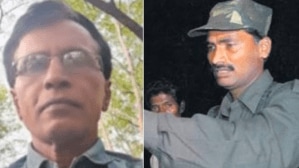After red flag, DAE chief told: let the PM speak
A day after Atomic Energy Commission chairman Anil Kakodkar told The Indian Express that Washington’s request for placing specific Indi...

A day after Atomic Energy Commission chairman Anil Kakodkar told The Indian Express that Washington’s request for placing specific Indian nuclear facilities in the civilian programme list amounted to changing “the goalpost”, the Government communicated to him that it would have been more appropriate had he waited for the Prime Minister to make a statement in Parliament on the Indo-US nuclear deal.
In an exclusive interview to this newspaper, (to be published on Wednesday), Kakodkar said that putting the Fast Breeder Reactor programme—and the indigenous reactors that feed it—in the civilian list would affect both “long-term energy security and maintaining the minimum credible deterrent.”
This is the first time Kakodkar has raised such concerns. In fact in July, 2002 when the then US Secretary of State Colin Powell was visiting India, Brajesh Mishra, as National Security Advisor, had offered to place at least two indigenous operating nuclear reactors under IAEA safeguards along with power-generating reactors and all reactors that New Delhi purchased from abroad. Kakodkar was AEC chairman then, and in the loop.
It is important to note here that the prototype fast breeder reactor was still in the making then and has now reached an advanced stage. The sense always was that this would be used for producing energy and for this purpose, India would not lose out by putting it on the civilian list.
In 1991-92, when R Chidambaram was AEC Chairman—currently PM’s Principal Scientific Advisor—it was decided not to expand uranium mining capacities in the hope that this could be imported in the wake of falling international prices. However, the Nuclear Suppliers Group made matters more difficult for countries like India to import uranium.
The UPA government took a strategic decision to increase uranium mining but the average ore grade is far less than what is available in Canada and Australia. Kakodkar is aware of this and, in fact, made these conclusions when he was sent to Jaduguda mines last September.
The Indo-US nuclear deal includes lifting NSG restrictions on India, which would then allow India to import nuclear fuel. Knowing well the constraints of uranium mining 1at home, the government is puzzled as to how Kakodkar proposes to ensure that energy production will largely depend on ‘‘resources available in India.’’





- 01
- 02
- 03
- 04
- 05


























